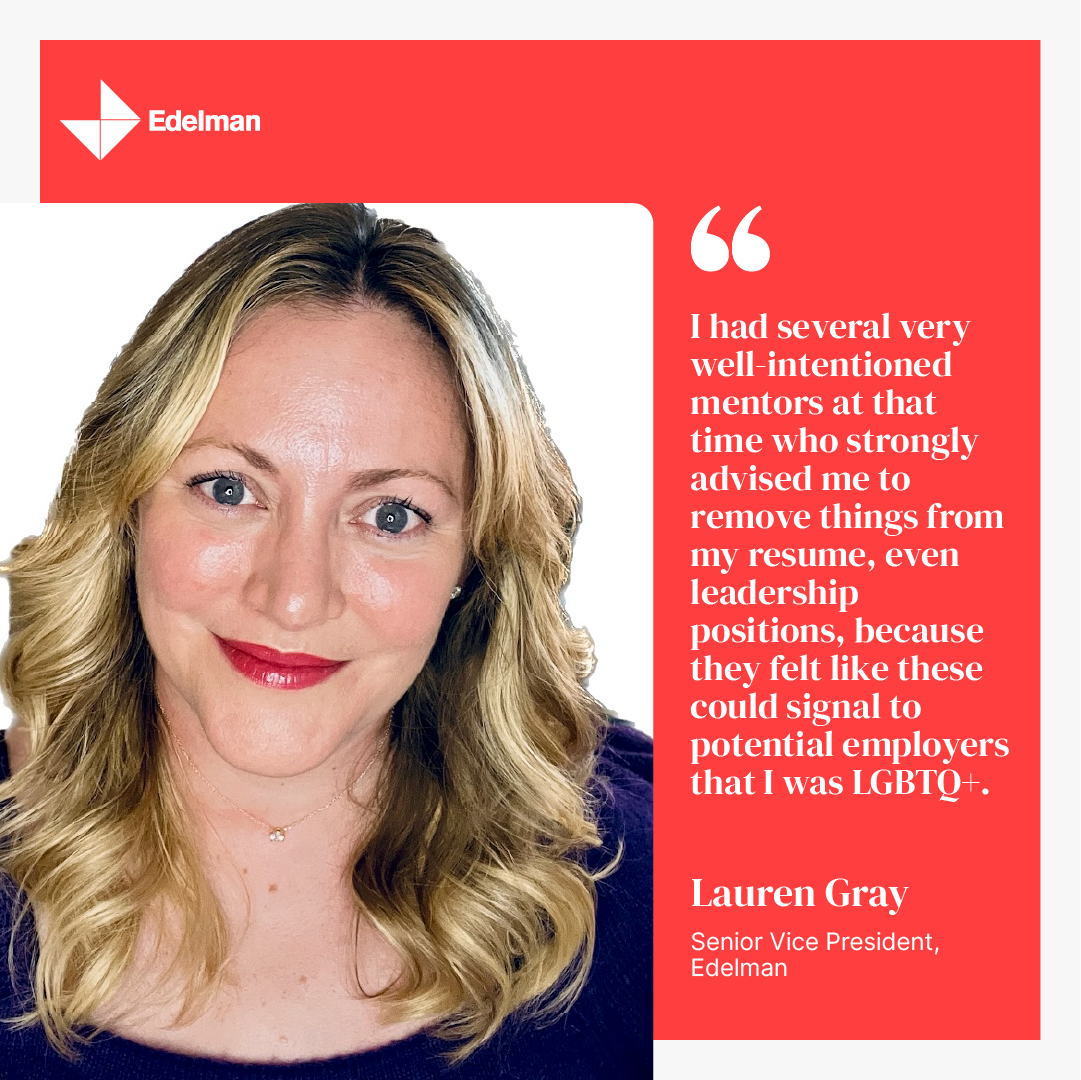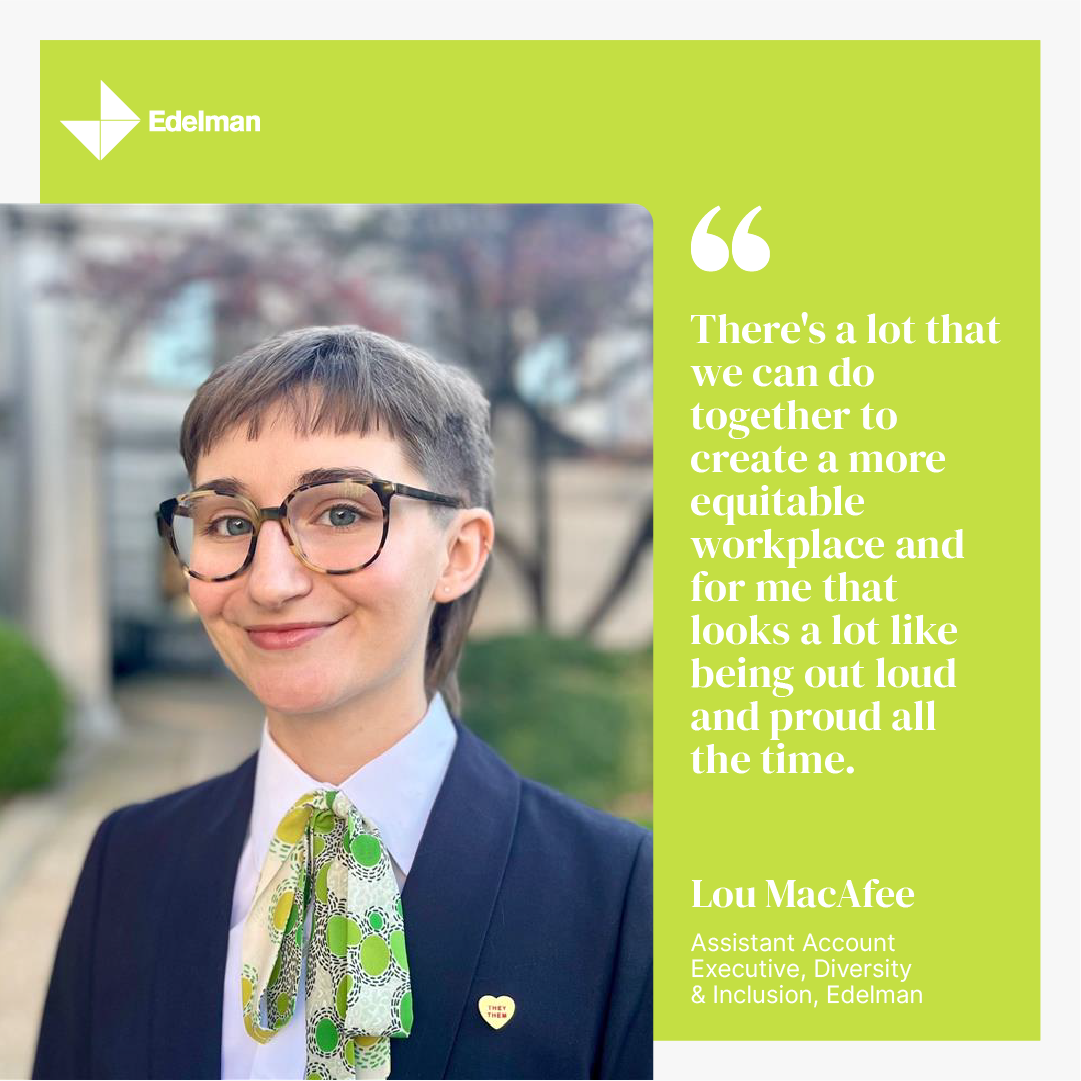In honor of International Women's Day, we are excited to present a special edition of our Inside Edelman series, dedicated to promoting gender equity and raising awareness of the challenges and threats that women still face today. By highlighting inspiring voices from across our network, we hope to spark meaningful conversations and inspire action towards a more equitable future.
Despite progress made in recent years, gender bias and discrimination are still prevalent. In this interview, we will explore these issues with Lauren Gray, a Senior Vice President on the Crisis and Reputation Risk team, and Lou McAfee, an Assistant Account Executive in the Global Diversity, Equity and Inclusion team, who will share their personal experiences and insights on how we can all work together to create a more equitable world.
Share a personal story of a time when you faced gender bias or discrimination in your career, and how you overcame it. How can we all work together to create a more equitable workplace?
Lauren Gray: One thing I'm very struck by is how different the workplace is now than it was much earlier in my career. I graduated from law school more than 15 years ago, and I remember working then with career advisors and mentors. I had several very well-intentioned mentors at that time who strongly advised me to remove things from my resume, even leadership positions, because they felt like these could signal to potential employers that I was LGBTQ+. This was well before the Supreme Court decision in Bostock vs. Clayton County in the U.S., which recognized federal anti-discrimination protections in the workplace on the basis of sexual orientation and gender identity. Most people don't realize that decision was just issued three years ago in 2020.
The prevailing thought at that time was that LGBTQ+ people should do what gay legal scholar Kenji Yoshino has described as “covering.” What I mean by that is that LGBTQ+ employees were often advised to go to great lengths to hide or downplay that part of ourselves at work. Those recommendations could have been anything from not putting pictures of our family on our desk to sidestepping small talk about what we did over the weekend or avoiding social media invites from our colleagues all the way to avoiding being out at work at all. LGBTQ+ people of color or those navigating other intersectional identities faced even greater challenges. And even though I was out at work, many of the LGBTQ+ people that I knew were not. Being LGBTQ+ actually shaped a lot of my career. I'd envisioned going to law school and becoming a small-town legal aid attorney in Ohio. But when my family really struggled after I came out during law school, I ended up charting a very different life and career trajectory. That was nearly two decades ago.
Even today, some small things can still feel meaningful. When I started at Edelman, for example, I recognized how much things have evolved when I placed a wedding photo of my wife and I on my desk. I think about how lucky we are to have a U.S. CEO like Lisa Ross at the helm who has spoken extensively about her commitment to DEI and that she views our team’s differences as something that makes Edelman stronger.
I know that there is a real storm happening right now. Externally, we're seeing a surge in anti-LGBTQ+ bills introduced across the country, particularly targeting our transgender community. But today, I just wanted to start our conversation by taking a moment to acknowledge the decades of work by LGBTQ+ movement advocates to help create change, as we contemplate how we can work together to address challenges moving forward.
Lou McAfee: It’s so interesting to hear you talk about your story. The experiences that you've had and how much the workplace has really transformed around LGBTQ+ inclusion and just inclusivity all up, is great.
I know that I'm newer to the workforce, being a younger Gen Z professional, and this is really my first corporate career opportunity. I have had a variety of experiences with that. I've also had a lot of mentors tell me very openly that I'm more than welcome — and encouraged — to put LGBTQ+ relevant experiences on my resume, whether that's advocating on a policy campaign that's driving the Equality Act, or if it's with a school club in college. It's so interesting to see how dramatically that has changed in the past two decades. Right?
It is incredible to hear the dramatic difference within our generations, which are not far apart, as you mentioned.
I so appreciate you sharing that because I think it's so important to remember how fast this movement is moving and how fast we need to continue to move to combat the increased rise of anti LGBTQ+ legislation that we're seeing today.
There's a lot that we can do together to create a more equitable workplace and for me that looks a lot like being out loud and proud all the time. And that's just something personal that I do to help make sure that those around me know that I'm a safe space for them to express either their gender identity or their sexuality freely as they see fit. And that's just one way that I try to make it known in the room that this is a space for queer people and everyone alike.
So, given how fast everything has changed over the past couple decades, and how fast this movement is still heading forward, what are some innovative solutions you've seen in our sector that help promote gender equity and inclusivity?
LG: It's a great question. We're seeing more conversations about radical transparency, and increased transparency which can have very important equity implications. So, for example, in New York, there’s been a lot of discourse on new laws regulating pay transparency. This change can really open the door to shifting how we think about and approach compensation systems that have historically disadvantaged women, particularly women of color.
We have also seen an increased push from employees to find out where their employers stand on societal issues, like racial equity, abortion, LGBTQ+ issues, and many others. In response, we're seeing employers grapple with offering potential travel benefits for employees, increasing organizational DEI commitments, examining which companies are making political donations to, and a number of other equity questions and considerations.
LM: I've really enjoyed watching all of these brands, organizations, nonprofits, and even the large tech companies get loud about their commitment to DEI. I look forward to continuing to watch that, and I’m excited to see how this movement around diversity, equity and inclusion really becomes an embedded practice in our society.
I know that even outside of our sector, we see how things like the digital divide creates a large equity gap that needs to be filled. That gap has a trickle-down impact on things as important as voting rights and accessibility. And so, in my previous experience, I worked on a few campaigns in Georgia, and we looked at rural communities that had less access to the Internet and had a difficult time getting access to information on how to register to vote and how to apply for an absentee ballot. With all of these digital and equity gaps that we see each day, we are seeing the long-lasting impacts that really show who is being heard and who is being left out of the conversation.
And I think as we've learned from the movement around diversity, equity and inclusion following the murder of George Floyd, it's really important that every voice is heard. And that everyone is brought into the conversation and has multiple seats at the table.
How can allies help advance gender equity? What are some of the actions that people can take to support gender equity in their personal and professional lives?
LG: First, I would say to allies: thank you. You're amazing. We appreciate you. You're an incredibly important part of equity work and progress more broadly.
One really important thing allies can do to help advance gender equity is to commit to continuing to learn more. Follow the news. Follow leaders and advocates on social media that are really at the forefront of these conversations.
Right now, in in the U.S., there's been a surge in anti-LGBTQ legislation. Just this week, the Human Rights Campaign, a key LGBTQ organization, cited that there are more than 410 anti-LGBTQ bills moving in 37 states across the country. These bills largely target our transgender community. These are huge numbers, with real implications for real people's day-to-day lives.
LM: I just want to first echo everything you just said. We all need to stay informed and get reliable information on the current state of play. We also need to make sure we are all getting involved.
And it's so important to be an ally. We really rely on our allies for their support in all of the movements the queer community has been a part of, and so thank you so much for your involvement and commitment to our community.
One thing that I think is important for allies to do is to start off by influencing your feeds on social media. Follow those organizations, some of which Lauren has called out, but also NCLR, which is the National Center for Lesbian Rights. You can follow the Sylvia Rivera Law Project, Trevor Project, Human Rights Campaign, GLAAD, the GenderCool Project and many other countless organizations, as well as influencers, that are really helping circulate information daily to combat the rise of anti LGBTQ+ legislation and stop the spread of harmful misinformation.
All of these organizations have wonderful, extensive lists of inclusive actions allies can take every day to help make this society a safer place for LGBTQ+ individuals and our youth. I encourage everyone to look at some of those actions and see what works best for you and your needs. Some of those actions might look like starting a conversation once a day about trans rights, or even just signing up to become a monthly member with the HRC. I think it looks different for everybody based on your own personal comfortability and situation, but anything that you can do to support the movement is greatly appreciated.
Lauren Gray is a Senior Vice President on the Crisis and Reputation Risk team, and Lou McAfee is an Assistant Account Executive in Global Diversity, Equity and Inclusion team.







